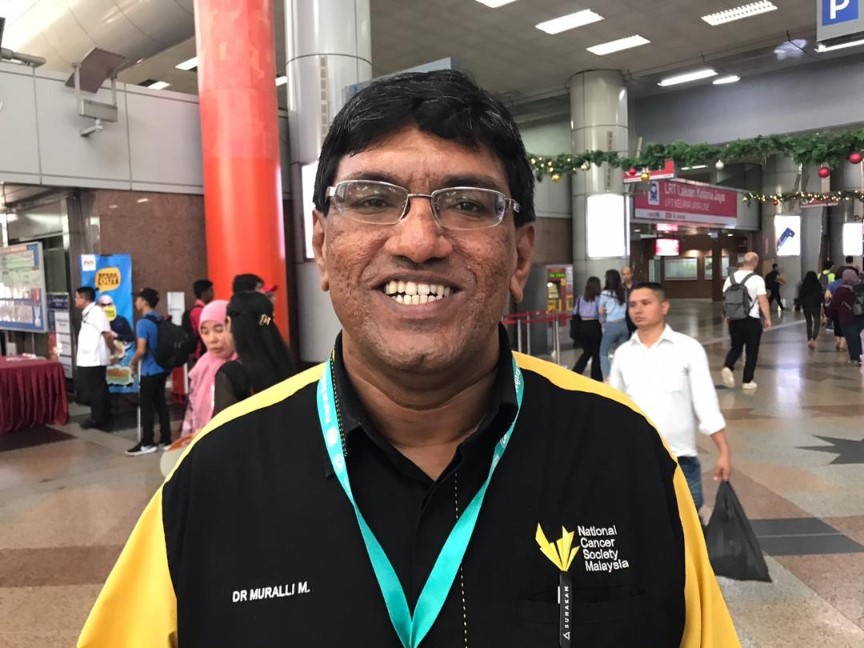KUALA LUMPUR, June 26 — Cancer advocates have welcomed the Ministry of Health’s (MOH) move in requiring doctors to notify it of cancer cases, but called for legislation to enforce this.
National Cancer Society of Malaysia (NCSM) medical director Dr M. Murallitharan pointed out that in the case of dengue, which must be notified to health authorities under the Prevention and Control of Infectious Diseases Act 1988, offenders can be fined if they do not report cases.
As a result, sometimes as many as five doctors report one dengue case because they have all seen the patient, he said.
“We have been advocating for this for a few years,” Dr Murallitharan told CodeBlue, when asked to comment on MOH making cancer a notifiable disease. “Legislation is what will ensure sustainability of this action.”
CodeBlue reported an April circular by Health director-general Dr Noor Hisham Abdullah that instructed registered medical officers and assistant medical officers across public and private health facilities, who are involved in diagnosing and treating cancer, to report all cancer cases to MOH through an online system.
Cancer registry data in Malaysia is more than five years’ old; the Malaysia National Cancer Registry Report 2012-2016 was released only in January this year. The previous cancer registry was also over a four-year period from 2007 to 2011.
“For a long time, voluntary reporting means that some ‘champions’ are the one who are pushing the reporting mechanism within their institutions but when people are not interested, they just don’t do it — because it’s seen as extra paperwork,” Dr Murallitharan said.
“Now if it is made notifiable, people are forced to incorporate it into their daily work. At the very least, they have to allocate some resources to it, i.e. maybe even one MO (medical officer) or nurse is now tasked to ensure that all reporting is carried out for that particular department. Before, if there was one interested individual in one department, they would report. If not, it would lie sometimes forgotten,” the cancer advocate added.
He noted that cancer cases may go unreported if patient care is spread across different departments and sometimes even hospitals, especially if the patient is moving in between the public and private sector.
“All this will go a long way to helping us identify the true burden of cancer in Malaysia and really be able to devote the required resources to it through better planning and allocation,” Dr Murallitharan said.

Dr Nirmala Bhoo Pathy, a public health medicine specialist, similarly called for legislation to enforce cancer as a notifiable disease, like in Singapore that has had a cancer registry since the 1960s.
“A cancer registry has been in our wish list for decades, and hearing this news is just wonderful. It is a first step in achieving success in cancer control,” she told CodeBlue.
“Legislation is needed to ensure that people take cancer registration seriously.”
Consultant breast surgeon Professor Dr Nur Aishah Md Taib told a recent webinar organised by the Galen Centre for Health and Social Policy that MOH had the right vision to improve the mechanism of reporting cancer cases, but noted that the reporting itself was still voluntary.
“Even at my hospital, we don’t report everything. In the past, only interested groups would do the reporting, so maybe the breast cancer group would report. But when we did a survey among the different disciplines within one hospital, some disciplines were not reporting because they never knew there was such a thing.
“So I think the mechanism of reporting is one thing, but the actual reporting is the other.”
She pointed out that reporting infectious diseases like tuberculosis and dengue, which may result in immediate deaths, has been made legally mandatory.
“But for cancer, you see the death is going to be five years or even two years later. Can we make it mandatory? I think we’ve been trying to advocate this to the MOH. I know the processes is going to be really difficult because you have to go to Parliament and make it an Act,” she said. “But is it worth it?”
Deputy Health Minister Dr Noor Azmi Ghazali gave his personal opinion that amending the Prevention and Control of Infectious Diseases Act to cover non-communicable diseases may be better.
“Data on cancer cases is important and must be as accurate as possible so that MOH can plan and focus on prevention and treatment, and also cover public health comprehensively for a better future for the country,” he told CodeBlue.








